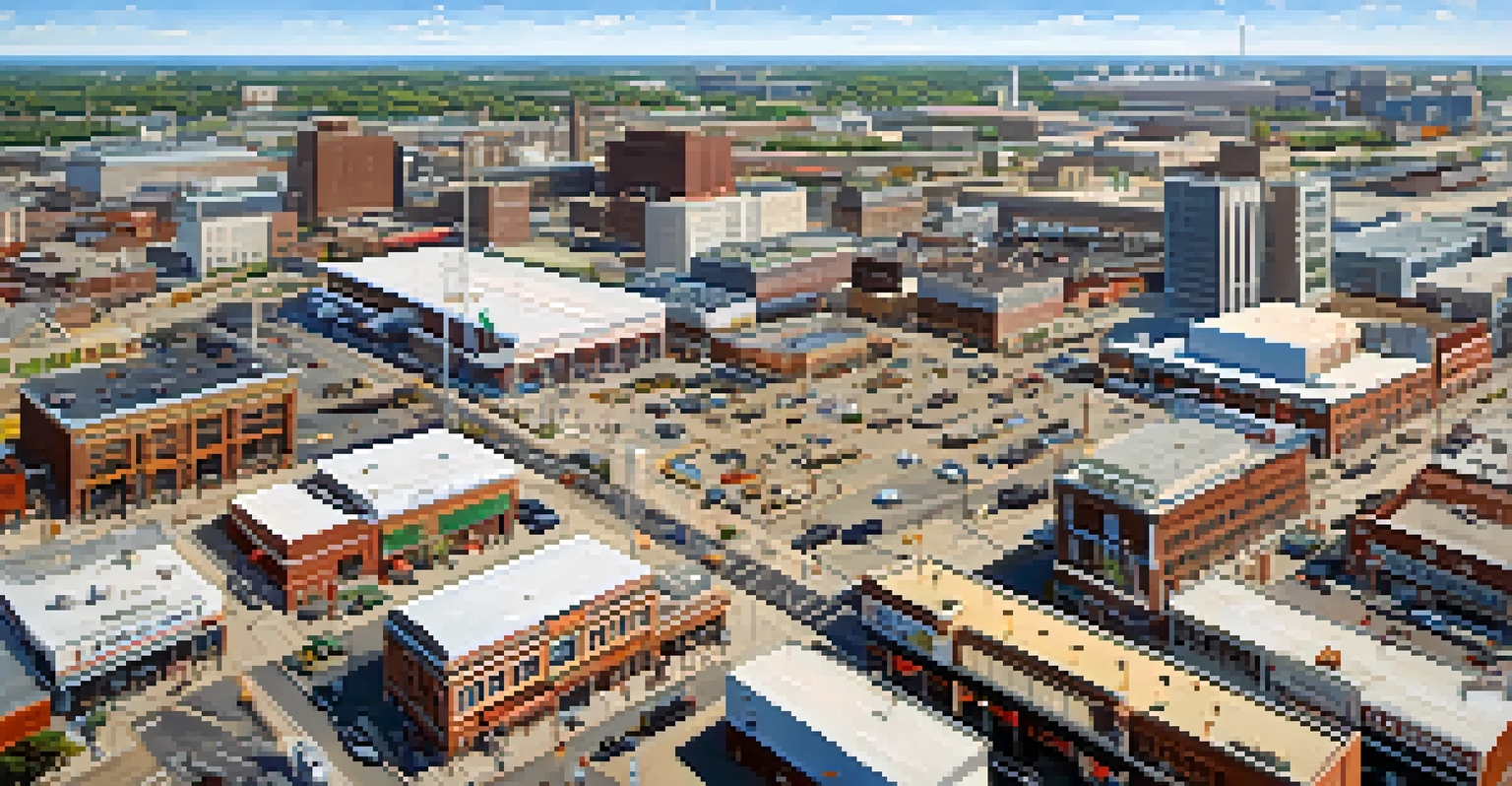Real Estate Trends and Their Economic Impact on Memphis

Understanding Memphis's Real Estate Market Dynamics
The Memphis real estate market has undergone significant changes in recent years, driven by factors like population growth and economic development. As more individuals and families relocate to the area, the demand for housing continues to rise, influencing both home prices and rental rates. This trend is particularly evident in neighborhoods that offer a blend of affordability and access to amenities.
Real estate cannot be lost or stolen, nor can it be carried away. Purchased with common sense, paid for in full, and managed with reasonable care, it is about the safest investment in the world.
Additionally, commercial real estate in Memphis is thriving, with businesses seeking to capitalize on the city's strategic location and transportation infrastructure. The influx of logistics and manufacturing companies has created a ripple effect, boosting demand for both residential and commercial properties. These dynamics contribute to a more vibrant local economy, benefiting various sectors.
Investors are also taking notice of Memphis's potential, with many looking to capitalize on undervalued properties. This has led to increased renovation and development projects, further revitalizing neighborhoods and enhancing community appeal. As the market evolves, it’s crucial for potential buyers and investors to stay informed about these trends.
The Role of Population Growth in Real Estate Demand
Population growth is a key driver of real estate demand in Memphis, with the city experiencing a steady influx of new residents. This growth stems from various factors, including job opportunities and the overall quality of life in the area. As more people move to Memphis, the need for housing naturally escalates, leading to increased competition in the market.

This surge in demand often results in rising home prices, making it more challenging for first-time buyers to enter the market. However, it also presents opportunities for sellers and investors looking to capitalize on the trend. Over time, neighborhoods that were once overlooked are now becoming hotspots for new developments and renovations.
Population Growth Fuels Housing Demand
The steady influx of new residents in Memphis is driving up the demand for housing, impacting home prices and rental rates.
Moreover, the demographic shifts in Memphis, including the influx of younger professionals and families, influence the types of housing that are in demand. There is a growing preference for modern amenities and walkable communities, which shapes the development strategies of builders and real estate agents alike.
Commercial Real Estate Growth and Its Economic Influence
Commercial real estate in Memphis is on the rise, with sectors like logistics and healthcare leading the charge. The city's central location makes it a prime hub for distribution, attracting businesses that want to optimize their supply chains. This growth not only boosts the commercial property market but also creates jobs, contributing to the overall economic landscape.
In the end, it’s not the years in your life that count. It’s the life in your years.
New developments, such as warehouses and office spaces, are popping up to meet the demands of expanding businesses. This influx of commercial properties enhances the local economy by generating tax revenue and providing employment opportunities. As more companies establish themselves in Memphis, the economic benefits extend beyond just real estate.
Furthermore, the growth of commercial real estate often leads to improvements in infrastructure and services, benefiting residents as well. Better roads, public transport, and community facilities arise to support the growing workforce, making Memphis an even more attractive place to live and work.
The Impact of Remote Work on Housing Preferences
The rise of remote work has reshaped housing preferences in Memphis, allowing residents to prioritize space and comfort over proximity to their workplaces. With many companies adopting flexible work policies, potential homebuyers are looking for properties that offer dedicated office spaces or extra rooms. This trend has led to a shift in demand from urban centers to suburban and rural areas.
As a result, neighborhoods that were once considered less desirable are now experiencing a resurgence in interest. Buyers are drawn to areas with larger homes and yards, seeking a more balanced lifestyle. This change not only affects residential sales but also influences commercial real estate, as businesses adapt to meet the needs of a remote workforce.
Commercial Real Estate Thrives
Memphis's strategic location is attracting businesses, leading to a surge in commercial real estate development and job creation.
Ultimately, the remote work trend is a double-edged sword for the Memphis real estate market. While it opens up new opportunities for buyers and sellers, it also presents challenges, such as ensuring that infrastructure and services keep pace with the evolving demands of residents.
Affordable Housing Initiatives and Their Economic Impact
Affordability remains a pressing issue in Memphis, prompting local government and organizations to implement initiatives aimed at increasing access to housing. Affordable housing projects are not just about providing shelter; they are also critical for economic stability. By making housing accessible, these initiatives help retain talent and promote community growth.
These programs often focus on revitalizing underdeveloped areas, which can lead to increased property values and local investment. As neighborhoods improve, the economic benefits can extend to local businesses, creating a vibrant community atmosphere. This cycle of investment and growth is essential for creating a sustainable economy.
Moreover, affordable housing initiatives can attract a diverse population, fostering a sense of community and inclusivity. A diverse demographic contributes to a richer cultural landscape, which can enhance the overall appeal of Memphis as a place to live and work.
The Influence of Interest Rates on Real Estate Activity
Interest rates play a crucial role in shaping the real estate landscape in Memphis. When rates are low, borrowing becomes more affordable, encouraging potential homebuyers to enter the market. This surge in demand can lead to increased competition, driving up home prices and creating a bustling market environment.
Conversely, when interest rates rise, the dynamics shift as borrowing costs increase. Potential buyers may hesitate to make a purchase, leading to a slowdown in the market. This fluctuation impacts not just residential sales but also commercial real estate, as businesses reassess their expansion plans based on the cost of financing.
Remote Work Shifts Housing Trends
The rise of remote work is changing housing preferences, with buyers seeking larger homes in suburban areas for a better work-life balance.
Understanding the relationship between interest rates and real estate activity is vital for both buyers and investors. By keeping an eye on economic indicators, individuals can make informed decisions that align with market trends, maximizing their opportunities in Memphis's ever-evolving landscape.
Future Predictions for Memphis Real Estate Trends
Looking ahead, the future of Memphis's real estate market appears promising, driven by ongoing economic development and demographic shifts. Analysts predict continued growth in both residential and commercial sectors as the city attracts new businesses and residents. This growth could lead to increased investment in infrastructure, further enhancing the appeal of Memphis.
Additionally, sustainability is becoming a key focus for future developments. As environmental concerns gain importance, developers are exploring eco-friendly building practices and energy-efficient designs. This shift not only meets consumer demand but also positions Memphis as a forward-thinking city.

Ultimately, staying informed about emerging trends and adapting to changing market conditions will be essential for anyone involved in Memphis real estate. By understanding these dynamics, buyers, sellers, and investors can navigate the landscape effectively and capitalize on the opportunities that lie ahead.